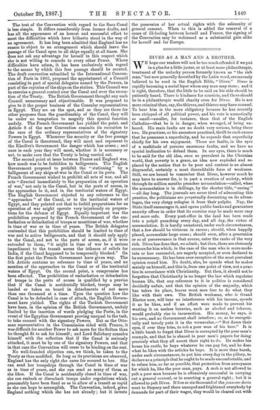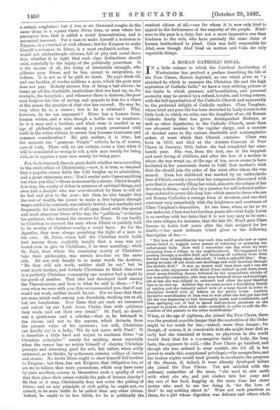DIVES AS A MAN AND A BROTHER.
WE hope our readers will not be too much offended if we put in a plea for a little juster, or at least more philanthropic, treatment of the unlucky person formerly known as "the rich man," but now generally described by the Latin word, erroneously believed to be used in the English Bible, "Dives." Dives is rapidly becoming a social leper whom any man may stone; and it is right, therefore, that the little to be said on his side should be patiently heard. There is kindness for convicts, and there should be in a philanthropic world charity even for Dives. He is not more criminal than, say, the thieves, and thieves may have counsel. To hear him is the more obligatory because he has recently been stripped of all political power, and his vote is numerically so small—smaller, for instance, than that of the English Catholics—that he is in danger, when wronged, of being un- heard. His main faults are no doubt very serious, being these two. He practises, or his ancestors practised, thrift to such excess that he possesses a superfluity, and he expends that superfluity chiefly for his own enjoyment. Those are faults, in the eyes of a multitude of persons enormous faults, and we have no special inclination to defend them. In our eyes, there is much to be said for the old idea, once so prevalent in the Christian world, that poverty is a grace, an idea now exploded and re- placed by the notion that to be poor and content is an almost disgraceful, certainly a most discreditable form of weakness. Still, we are bound to remember that Dives, however much he may have to answer for, is in part a creation of society, which through its million mouths preaches accumulation—called, when the accumulation is in shillings, by the shorter title, " saving " —all day long. The journals are never tired of advocating this practice, the politicians are perpetually descanting on its advan- tages, the very clergy eulogise it from their pulpits. Nay, the State itself encourages it, and opens public banks and guarantees annuity offices in order that its exercise may be made more easy and more safe. Every post-office in the land has been made into a pulpit preaching every day, and all day, the virtue of accumulation. It is hardly unnatural, under such circumstances, that a few should be virtuous in excess ; should, when happily placed, accumulate large sums ; should even, after a generation or so of perseverance in that course, enter the ranks of the very rich. Dives has done that, we admit; but then, there are obviously excuses for him which, in the case of the man who is more mode- rate or less successful, are eagerly accepted, or even declared to be unnecessary. He has been over-receptive of the most prevalent opinion round him. No doubt, also, he spends what be makes mainly on himself, and this is, from one point of view, note prac- tice in accordance with Christianity. But then, it should not be forgotten that Christianity is no longer the law which regulates human life, that any reference to it in politics is considered decidedly unfair, and that the opinion of the majority, which has taken its place, leaves most men free to do what they like with their own. The British workman, who is Grand Elector now, will bear no interference with his income, spends it as be likes, and if an effort were made to prevent his wasting it on useless luxuries, such as alcohol and tobacco, would probably rise in insurrection. His money, he says, is his own, and no Government shall interfere; or, as he energeti- cally and tersely puts it in the vernacular,—" But damn their eyes, if ever they tries, to rob a poor man of his beer." It is a little harsh to forget that Dives is corrupted by the poor man's example, and that he is abused in poor men's papers for doing precisely what they all assert their right to do. He makes his house his castle, he boys whatever he can pay for, and he does what he likes with the articles he buys. It is more than harsh, under such circumstances, to put him every day in the pillory, to declare sea principle that he ought to be made uncomfortable, and to refuse him, so far as possible, that protection from annoyance for which he, like the poor man, pays. A mob is not allowed to pelt a poor man because he is offensively successful in carrying out a general counsel, or in asserting a general right; bat it is allowed to pelt Dives. If five or six thousand of the jeunesse cleric went to Stepney and there annoyed and frightened everybody by demands for part of their wages, they would be cleared out with a certain roughness ; but if five or six thousand roughs do the same thing in a square where Dives lives, or even where his purveyors live, that is called a social demonstration, and is accounted innocent. For a man to make himself a nuisance to Exignus, is a criminal or civil offence; but for Exigaus to make himself a nuisance to Dives, is a most creditable action. We would ask philanthropic citizens, full of pity and social devo- tion, whether it is right that snob class distinctions should exist, especially to the injury of the politically powerless. It is the master of all, the being of irresistible strength, who pillories poor Dives, and he has, except in emigration, no redress. It is not as if he paid no taxes. He pays them all, and one besides, of twelve millions a year, which the poor man does not pay. Nobody accuses him of being a bad citizen ; he keeps up all the charitable institutions that are kept up, as, for example, the hospitals ; and whenever there is distress, the poor man forgives his vice of saving, and appeals to him for a share of the means the practice of that vice has secured. He may be, very often he is, a sinner ; but is he a criminal ? Why, however, do we use argument ? Dives has a human form, human wishes, and a vote, though a feeble one in numbers; he is a man and a brother, and what more is needful in an age of philanthropy, and among a people penetrated with faith in the softer virtues, to secure him humane treatment and common consideration ? He gets neither, it is true ; but the moment the "generous People" reflects, he is, of course, sure of both. There will, we are certain, come a time when it will be considered as wrong to rob a rich man merely for being rich, as to oppress a poor man merely for being poor.
For, be it observed, there is great doubt whether even according to the strict ethics of Christianity,—now, it is true, so despised that a popular orator holds the bold burglar up to admiration, and a great statesman says,' Don't render unto Camay anything but what you like,'—Dives is necessarily a sinner. Christ taught, it is true, the vanity of riches in presence of spiritual things, and even told a disciple who was over-absorbed by them to sell all he had and give to the poor ; but then, he also taught that the root of wealth, the power to make a free bargain through wages settled by contract, was entirely lawful; and markedly and frequently, for the instruction of all ages, dined with the special and most obnoxious Dives of his day, the "publican," or foreign tax-gatherer, who farmed the revenue for Rome. It can hardly be Christian to account the man whom Christ so publicly held to be worthy of Christian comity, a social leper. As for the Apostles, they were always preaching the right of a man to his own. St. Peter, whom half the Christian world holds first among them, explicitly taught that a man was not bound even to give to Christians, if he were unwilling ; while St. Paul, from whom the remaining moiety of Christians take their philosophy, was sternly absolute on the same side. He not only taught in so many words the doctrine, "He that will not work, neither shall he eat," but he went much further, and forbade Christians to think that even in a perfectly Christian community one member had a right to the goods of another. That idea had developed itself among the Thessalonians, and here is what he said to them :—" For even when we were with you, this we commanded you, that if any would not work, neither should he eat. For we hear that there are some which walk among you disorderly, working not at all, but are busybodies. Now them that are such we command and exhort by our Lord Jesus Christ, that with quietness they work, and eat their own bread." St. Paul, no doubt, was a gentleman and a scholar,—that is, he belonged to the classes and not to the masses, which detracts from the present value of his opinions ; but still, Christians can hardly say in a body, 'We do not agree with Paul.' It is therefore a little hard and unjust to condemn Dives "on Christian principles" merely for existing, more especially when the censor has no notion himself of obeying Christian precepts and returning good for evil, but rather, when evilly entreated, as he thinks, by policemen, returns volleys of curses and stones. No doubt Dives ought to show himself full brother to Exiguns ; but then, has not Exiguns that obligation too, or are we to believe that mere possessions, which may have come by pure accident, convey in themselves such a quality of evil that they place their owner outside the pale of human charity ? Be that as it may, Christianity does not order the pelting of Dices; and on any principle of civil polity, he ought not, we submit, to be more liable to be pelted than any other citizen. Indeed, he ought to he less liable, for he is politically the
weakest citizen of all,—one for whom it is now only kind to appeal to the forbearance of the majority of the people. Kind- ness to the poor is a duty, but not a more imperative one than kindness to the rich, who have precisely the same claim of human brotherhood to plead. Cain was held responsible for Abel, even though Abel lived on mutton and Cain ate only vegetable things.



































 Previous page
Previous page